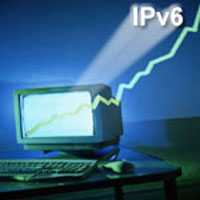Measuring the success of the next generation Internet

IPv6 will play a key role in the next generation Internet. It promises to deliver better quality services than the existing Internet, but how can we be sure? IST project 6QM was set up to ensure service providers deliver what they promise.
The 6QM project has developed technology to measure the quality of service (QoS) in IPv6 networks. “A prominent feature that we are concentrating on in our measurement system is the capability to perform passive flow measurement,” says Rudolf Roth, project partner and senior scientist at Fraunhofer FOKUS.
“When a service provider offers a certain quality of service it is necessary to validate that the promised quality is actually delivered. The system tests this by observing the actual traffic flowing through the Internet, to give an accurate picture of the service being delivered,” adds Roth. Measurement results can be displayed graphically so it is easy to see if the quality of service meets the agreed service level agreement.
The measurement system is a lightweight software solution that can be easily deployed into various parts in the network and in end-systems, including handheld mobile devices. “An important part is the configuration of the probes, and how to specify what to measure,” furthers Roth.
The system was developed in joint partnership between partners from industry and research. Coordinated by Hitachi Europe, France Telecom R&D, Consulintel, S.L. and Fraunhofer FOKUS make up the other partners in 6QM. The involvement of Hitachi Ltd. Japan underlines the global importance of research issues addressed in the project.
Public presentations of the system in various application scenarios have taken place to demonstrate the viability of the measurement approach. The quality of multimedia streaming over satellite links was measured and presented at Cebit Hannover and Global IPv6 Summit 2003 in Madrid.
Another demonstration at 6NET Spring Conference, held in Brussels on 18-19 May 2004, showed how the 6QM system can test the quality of service in an online gaming context. The system was used to measure the delay between the game server and players located in Madrid, Brussels, Berlin and Tokyo. Such information can be used in order to give better fairness to online gamers by compensating for differences in the delay experienced by the participating players.
Researchers from 6QM are actively participating in the Internet Engineering Task Force (IETF) to develop standards for QoS measurement. “A major part of the work [at 6QM] is to contribute to upcoming standards,” says Roth and he describes the measurement system as a “necessary piece in the whole picture” for the progress of IPv6.
The project will also look into how to perform measurements across multiple administrative domains and further research into how to best configure the probes and how to scale high volumes of measurement data. The 6QM project will concentrate on scenarios in home automation networks to demonstrate the system’s applicability to future technologies.
Media Contact
All latest news from the category: Information Technology
Here you can find a summary of innovations in the fields of information and data processing and up-to-date developments on IT equipment and hardware.
This area covers topics such as IT services, IT architectures, IT management and telecommunications.
Newest articles

Properties of new materials for microchips
… can now be measured well. Reseachers of Delft University of Technology demonstrated measuring performance properties of ultrathin silicon membranes. Making ever smaller and more powerful chips requires new ultrathin…

Floating solar’s potential
… to support sustainable development by addressing climate, water, and energy goals holistically. A new study published this week in Nature Energy raises the potential for floating solar photovoltaics (FPV)…

Skyrmions move at record speeds
… a step towards the computing of the future. An international research team led by scientists from the CNRS1 has discovered that the magnetic nanobubbles2 known as skyrmions can be…





















